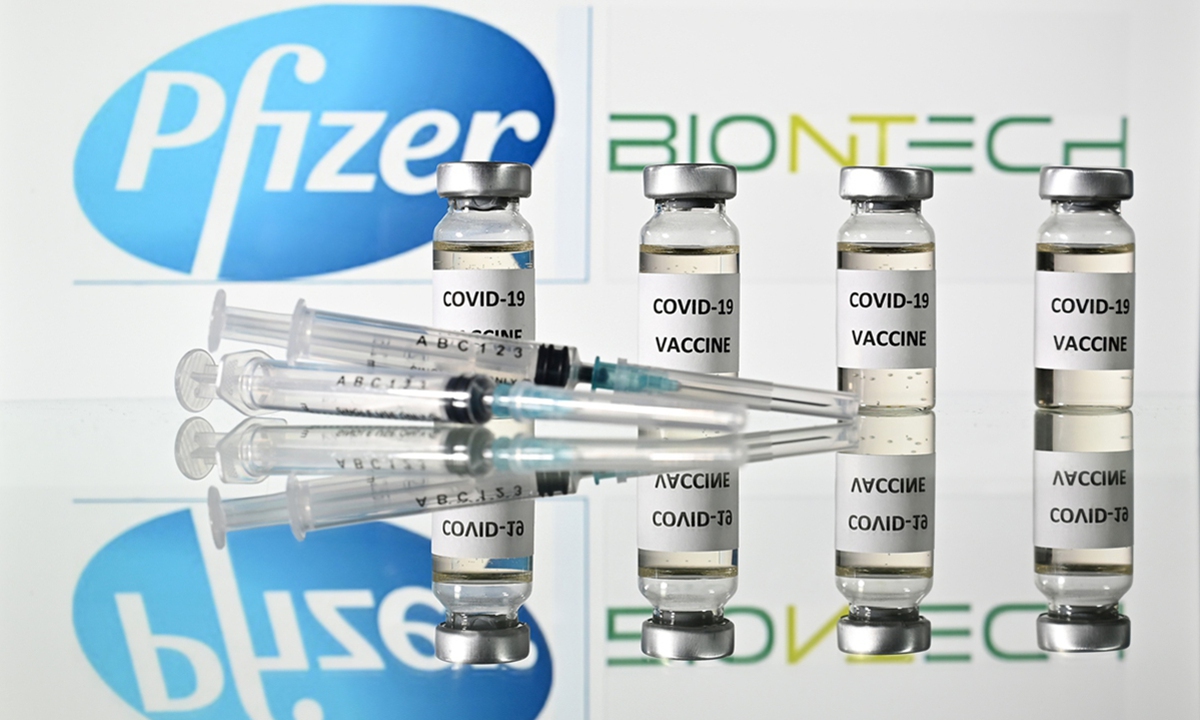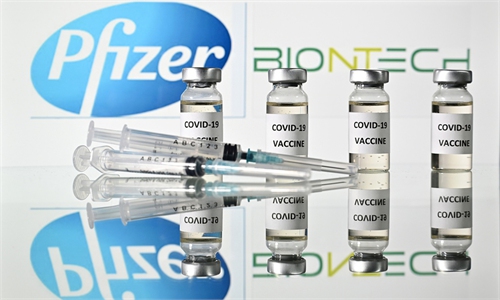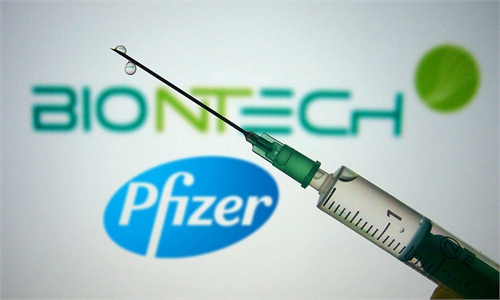Chinese health experts advise Australia to halt approval for Pfizer vaccine following Norwegian deaths

An illustration shows vials of a COVID-19 vaccine and syringes with the logos of US pharmaceutical company Pfizer and German partner BioNTech. Photo: AFP
Countries like Australia, which is expected to soon give the green light to Pfizer-BioNTech's COVID-19 vaccine for use in elderly people, need to suspend their approval procedures to wait for the World Health Organization (WHO) and Norway to investigate deaths in Norway, Chinese health experts said.
They said that for mass vaccination programs, Australia should broaden its choices of COVID-19 vaccines, such as purchasing Chinese-produced inactivated vaccines.
The deaths of 23 elderly Norwegian people after receiving the vaccine have raised concern in Australia. Federal Health Minister Greg Hunt has been in contact with the Australian medical regulator, Therapeutic Goods Administration (TGA), "requesting that it seek additional information, both from the company and the Norwegian medical regulator," Australian media reported.
Australia has ordered 10 million doses of the Pfizer vaccine, and it had planned to approve the use of the vaccine by the end of this month. The priority groups include 190,000 aged care and disability care residents, according to Australian media.
The WHO said that it is aware of the deaths in Norway, and it will closely follow the investigation into the causes and circumstances of the deaths, Sputnik reported.
The TGA issued a statement, which Australian media ABC News said "downplayed concerns," saying that the Norwegian deaths were associated with fever, nausea and diarrhea, which are relatively common short-lived effects that a number of people experience after vaccinations.
"It is not expected that these common adverse reactions following immunization will be of significance in the vast majority of individuals vaccinated with the Pfizer BioNTech vaccine," it said on its website.
The TGA said it will continue to work with European regulators in the coming days to investigate this report and determine whether specific warnings about the risks of vaccination in the very frail elderly or terminally ill should be potentially included in the product information for the Pfizer BioNTech vaccine.
The issue prompted Australian experts to suggest giving elderly and frail people an alternative vaccine.
An infectious disease expert from Australian National University, Professor Sanjaya Senanayake, said if people over 85 in nursing homes were vulnerable to the effects of the Pfizer vaccine, then they could use another vaccine - the AstraZeneca vaccine, ABC News reported on Tuesday.
A health officer of Australia said that most Australians would receive the AstraZeneca vaccine because the country is producing it.
Some Chinese health experts said that Australia should not go ahead with the approval of the Pfizer vaccine before the investigation result of the Norwegian deaths is released.
A Beijing-based immunologist, who requested anonymity, told the Global Times on Tuesday that Australia should wait for the WHO's advice and Norway's investigation results, and the country could wait as Australia is in summer now, when the coronavirus is relatively mild.
Australia should conduct risk assessment on the risks and benefits for elderly people to receive the Pfizer vaccine, Jiang Chunlai from Jilin University's School of Life Sciences told the Global Times on Tuesday.
As for the alternative option of the AstraZeneca vaccine for elderly people, the Chinese immunologist said it's possible that adverse reactions of high-grade fevers and nervous-system effects sometimes can be more lethal for elderly people in nursing homes than the Pfizer vaccine.
The immunologist said for elderly people, a vaccine may not be a good preventive measure as it may lead to deaths due to their low immunity. He said tightening management and disinfection procedures in nursing homes could be more effective.
For Australia's mass vaccination program, which is expected to kick off next month, Chinese experts advised Australia to broaden its choice of vaccines, including purchasing Chinese-developed inactivated vaccines, which are relatively safer due to their mature technology.



